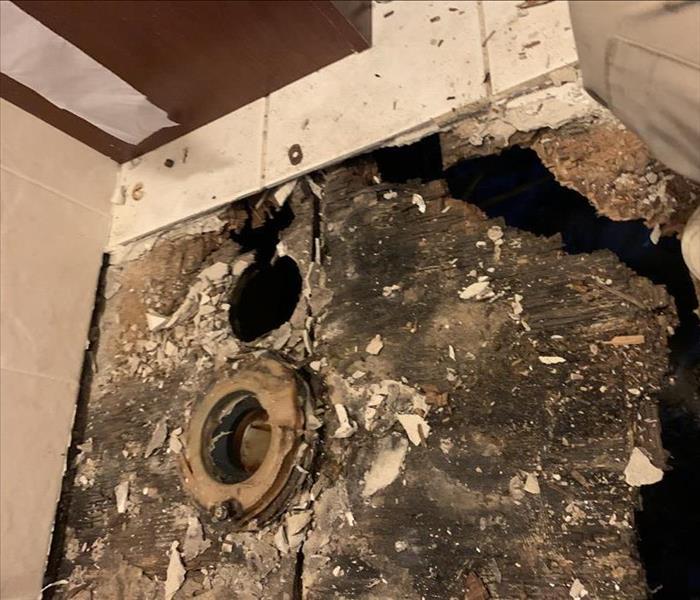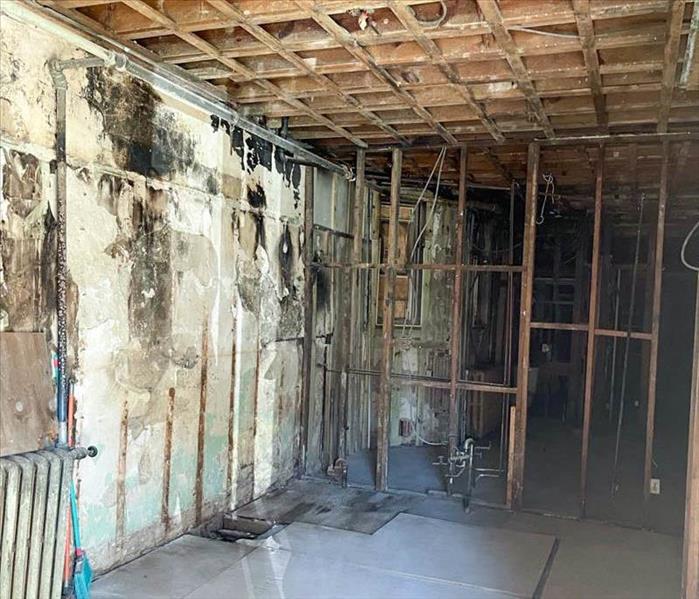Mold in Rental Properties: Tenant and Landlord Responsibilities
3/20/2024 (Permalink)
 Trust SERVPRO® to efficiently and effectively address mold concerns and restore your rental property.
Trust SERVPRO® to efficiently and effectively address mold concerns and restore your rental property.
Mold in rental properties can be a significant concern, impacting both tenants and landlords. Understanding the responsibilities of each party is crucial for preventing mold growth, addressing issues promptly, and maintaining a safe living environment. In this blog post, we'll explore the responsibilities of tenants and landlords in dealing with mold in rental properties.
Tenant Vigilance
Tenants play a vital role in mold prevention through vigilance and awareness. Regularly inspect your living space for any signs of mold, such as musty odors, visible discoloration, or water stains. Report these concerns to your landlord promptly. Early detection can prevent the escalation of mold issues and contribute to a nicer living environment.
Proper Ventilation
Tenants can take proactive measures to minimize the risk of mold growth. Ensure proper ventilation by using exhaust fans in bathrooms and kitchens. Adequate ventilation helps reduce humidity levels, making it less conducive for mold to thrive. Additionally, allowing air to circulate by not blocking vents or air ducts can contribute to a drier environment.
Prompt Reporting of Issues
Tenants should promptly report any water leaks, plumbing problems, or signs of water damage to their landlords. Timely reporting allows landlords to address the root causes of moisture and take preventive measures against mold growth. Clear communication between tenants and landlords is essential for a swift response to potential mold issues.
Landlord Maintenance
Landlords are responsible for maintaining the property and addressing potential sources of moisture. Regular inspections, especially before new tenants move in, can help identify existing mold problems and ensure they are remedied. Landlords should also conduct routine maintenance, such as roof and plumbing inspections, to prevent water intrusion and mitigate the risk of mold growth.
Swift Response to Water Damage
Both tenants and landlords should prioritize a swift response to water damage. Whether it's a leaky roof, burst pipe, or appliance malfunction, immediate action is necessary to prevent mold from taking hold. Landlords should have an emergency response plan in place, and tenants should report water damage promptly for efficient remediation.
Professional Mold Remediation
If mold is discovered, landlords should hire professional mold remediation services like SERVPRO®. Certified mold remediation experts can assess the extent of the issue, develop a comprehensive remediation plan, and restore the property to a mold-free condition. Tenants should cooperate with the remediation process and follow any instructions provided by the professionals.
Open Communication
Maintaining open communication between tenants and landlords is crucial for addressing mold-related concerns effectively. Tenants should document their communication, including notifications of mold issues and responses received. Landlords should keep records of inspections, maintenance, and remediation efforts. This documentation fosters transparency and helps prevent disputes.
Preventative Measures
Preventing mold in rental properties requires a proactive approach. Landlords can take preventative measures such as installing proper ventilation systems, using mold-resistant materials, and addressing water issues promptly. Tenants can contribute by practicing good housekeeping habits, promptly reporting leaks, and ensuring proper ventilation in their living spaces.
A collaborative effort between tenants and landlords is essential for preventing and addressing mold issues in rental properties. By understanding and fulfilling their respective responsibilities, both parties can contribute to creating a safe and mold-free living environment. For professional mold remediation services, trust SERVPRO® to efficiently and effectively address mold concerns and restore your rental property.
Who is Responsible for Mold in My Rental Property?
11/8/2023 (Permalink)
 Landlords should ensure that the rental property is well-maintained to prevent conditions conducive to mold growth.
Landlords should ensure that the rental property is well-maintained to prevent conditions conducive to mold growth.
Maintaining a safe and comfortable living environment in rental properties is essential for tenants and landlords alike. One issue that can affect this balance is mold growth. In this blog, we will explore the responsibilities of both tenants and landlords concerning mold in rental properties. By understanding these roles, we can help ensure a harmonious and mold-free living experience for all.
Tenant Responsibilities
As a tenant in a New Jersey rental property, you play a vital role in maintaining a safe and mold-free living environment. Mold can be a persistent issue, but with the right practices, you can help ensure a comfortable and healthy space for yourself and fellow occupants. Here are some key tenant responsibilities to keep in mind:
- Routine Inspections: Tenants should conduct regular inspections of their rental units for signs of moisture or mold growth. Pay attention to areas like bathrooms, kitchens, and basements, which are more prone to dampness.
- Proper Ventilation: Ensure that the property is adequately ventilated. Use exhaust fans when cooking or showering, and keep windows open to promote air circulation, especially during humid weather.
- Prompt Reporting: If you notice any signs of mold, such as a musty odor or visible growth, report it to your landlord immediately. Timely reporting is crucial to address the issue promptly.
- Maintain Cleanliness: Keep the rental property clean and dry. Regular cleaning can prevent mold-friendly conditions from developing. Be especially diligent in areas susceptible to moisture, like the bathroom.
- Address Moisture Sources: If you identify leaks or water intrusion, inform your landlord promptly. Preventing water from entering the property is key to mold prevention.
Landlord Responsibilities
For landlords in New Jersey, providing a safe and comfortable living environment for tenants is not just good practice—it's a legal obligation. When it comes to mold issues, there are specific responsibilities that landlords must uphold to ensure tenant well-being and satisfaction. These responsibilities are not only essential for compliance with the law but also for fostering positive landlord-tenant relationships. Here are the key responsibilities that landlords in New Jersey must be aware of:
- Mold Disclosure: Landlords in New Jersey are legally required to disclose any known mold issues to prospective tenants. This should be part of the rental agreement or lease.
- Prompt Remediation: Landlords must take immediate action when mold is reported. This includes arranging for professional mold remediation services, such as those provided by SERVPRO®, to address the issue swiftly and effectively.
- Maintain Property: Landlords should ensure that the rental property is well-maintained to prevent conditions conducive to mold growth. This includes addressing any structural issues, such as leaks or damaged roofing.
- Proper Ventilation and Insulation: Landlords should install and maintain proper ventilation systems and insulation to minimize moisture buildup and temperature fluctuations within the property.
- Educate Tenants: It's beneficial for landlords to educate tenants about mold prevention measures and provide guidelines on how to maintain a mold-free environment.
In New Jersey, the responsibilities of tenants and landlords regarding mold in rental properties are well-defined. By understanding and fulfilling these responsibilities, we can create healthier and more comfortable living conditions for everyone involved. If you suspect mold in your rental property, contact SERVPRO® of Berlin/Williamstown for expert mold remediation services. We're here to help ensure that your rental property remains a safe and enjoyable place to call home.
Unseen Intruders: The Top 3 Hidden Places Where Mold Can Lurk in Your Home
5/25/2023 (Permalink)
Mold growth can be a sneaky intruder in our homes, often hiding in places that are not immediately visible. Detecting and addressing mold in hidden areas is crucial to prevent its spread and protect the health of the occupants. In this blog, we will explore the top three hidden places where mold can be found.
Behind Walls and Wallpaper
Mold can thrive in the dark, damp spaces behind walls and wallpaper. This can occur when there is a leaky pipe, condensation buildup, or water intrusion from the outside. Mold can grow on the backside of walls and wallpaper, and if left undetected, it can spread and cause structural damage. Keep an eye out for any signs of water damage, musty odors, or peeling wallpaper, as these can be indications of mold growth behind walls.
Underneath Flooring
Another common hidden place for mold growth is underneath flooring materials, such as carpets, laminate, or vinyl flooring. If there has been a water leak, spill, or high humidity in an area, moisture can seep into the sub flooring or under the flooring material, providing the ideal conditions for mold growth. Mold can thrive in the dark and damp spaces underneath flooring, and it may not be noticeable until there are visible signs of damage or a musty smell.
Inside HVAC Systems
Heating, ventilation, and air conditioning (HVAC) systems can also be a breeding ground for mold growth. Mold can thrive in the dark, moist environments of air ducts, air handlers, and cooling coils if there is excess moisture, poor ventilation, or a buildup of dust and debris. Mold spores can then be circulated throughout the property via the HVAC system, leading to widespread contamination. Regular HVAC maintenance, including cleaning and inspection, can help prevent mold growth in these hidden areas.
Mold can be found in various hidden places in our homes, and early detection is key to preventing its spread. Regular inspections, vigilant monitoring of any signs of water damage or musty odors, and proper maintenance of HVAC systems and flooring materials can help identify hidden mold growth. If you suspect mold in hidden areas, it's essential to hire a qualified mold remediation professional to assess and safely address the issue. Taking proactive measures to detect and address mold in hidden places can help maintain a healthy indoor environment and protect your home and well-being.
 Trust SERVPRO® to efficiently and effectively address mold concerns and restore your rental property.
Trust SERVPRO® to efficiently and effectively address mold concerns and restore your rental property.



 24/7 Emergency Service
24/7 Emergency Service
